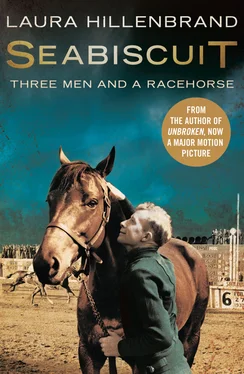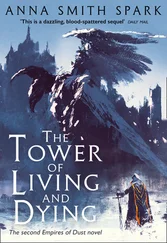Finally, jockeys would not allow themselves to admit to their injuries because that would open the door to their ultimate enemy: fear. To acknowledge pain was to acknowledge danger. In their line of work, fear had a physical presence. Once a jockey let it into his head, it would rise up over him on the track, paralyzing him. Winning jockeys are daring jockeys, capable of gunning a horse through the narrowest hole with damn-the-torpedoes bravado. Frightened jockeys take what Luther called “the married man’s route,” timidly detouring around the outside of the pack. No one would hire a man who hesitated in the heat of battle. Jockeys could smell fear in one of their own and would exploit it mercilessly, trying to intimidate their way past a rival. “If a jock showed even the slightest trace of cowardice,” wrote Arcaro, “ it could get awfully rough out there.”
As a result, jockeys never, ever spoke about danger, pain, or fear, even among themselves. In conversation they papered over the grim realities of their jobs with cheery euphemisms. Hideous wrecks were referred to as “spills”; jockeys hurled into the ground were “unseated.” In their autobiographies, they recounted great races in intimate detail, but falls and injuries were glossed over with the most perfunctory language. Even in the grip of agonizing pain or complete debilitation, most jockeys clung to their illusion of invulnerability.
For some, fear had a way of breaking through the illusion. “ You didn’t talk about it,” remembered Farrell Jones, a jockey tough enough to earn the nickname “Wild Horse.” “I thought about it. I don’t know if any of them other guys did. But I did. I was spooky.” Even Arcaro, one of the most daring riders, admitted that the memory of his first spill, in which a horse stepped on his back and another kicked his skull, leaving him with a concussion, two fractured ribs, and a punctured lung, was seared into his memory and burned there for the rest of his career. It was, he wrote, “a terrifying experience that somehow cannot be blotted out.”
For riders’ families, the danger and injuries took their toll. In dreams, Helen Luther saw her husband’s death play itself out countless times. In murky images, his horse would spiral into the ground, carrying Tommy under him, and Helen would wake into a life striated with fear.
Helen watched Tommy ride every day. She was a rarity in the sport. The vast majority of jockeys’ wives couldn’t stand to watch their husbands’ races and rarely, if ever, came to the track. Helen missed only one ride. On that day, a horse named Brick Top speared Tommy’s head into the steel overhead beam of the starting gate. He lay on the ground, his skullcap split, refusing to let the attendants take him to the hospital. “My wife will be here,” he kept repeating, sure that Helen was up in the stands. Helen didn’t come, and though Tommy recovered, she never ceased regretting it.
Forever after, Helen was there, her eyes trained on every move of her husband’s horses. She was frightened for every minute of his career. Sometime early in her marriage, Helen began a ritual: Each time his mount left the paddock and set his first forehoof onto the track, she would pray that the horse would see him home safely.
Helen’s prayers failed Tommy on a rain-drenched July afternoon at Empire City. He was a sixteenth of a mile away from winning a race when the filly he was riding abruptly tripped over her own legs and plunged headfirst into the track. Helen saw her husband ride the arc of the filly’s back down into the mud and disappear under her tumbling body and the bodies of the three horses who struck her from behind. Their hooves cracked into Tommy’s head as they fell.
Helen never knew how she got from the grandstand to the track. Her mind drummed: He is under all those horses. The next thing she recalled, she was standing over her husband. She was sure he was dead.
They carried Tommy into the first-aid room on a stretcher. His ancient valet, Johnny Mitchell, bent over him, his tears falling onto Tommy’s cheeks as he gently sponged the mud and blood away. Helen stood back and stared at her husband. He didn’t move. Helen was seized in violent tremors, and her teeth chattered uncontrollably. She heard someone say, “This woman is in shock” and felt someone slip a brandy into her hand. She refused it. The man who fetched it, badly shaken, drank it himself.
They loaded Tommy into an ambulance and drove him toward St. John’s Hospital. Helen was left alone to find her own way there. She got into Tommy’s car and drove around New York, confused by the unfamiliar streets. The fuel gauge read empty, so she pulled over at a gas station. The attendant hooked up her car to the pump and came over to chat with her.
“Isn’t it too bad?” he said. “Tommy Luther was killed.”
Helen whirled in panic. She didn’t know what to do or where to go. She briefly thought she should go back to the track. She changed her mind and went toward the hospital. Somehow, she found it. She ran in. Tommy was still alive. Helen nearly collapsed.
Tommy survived. He would have no short-term memory for several days and no depth perception for six months. He staggered like a drunk for a good while. But he would ride for twenty more years, bearing only a single scar from a hoof.
Helen went back to their lodgings alone. It was a rental house in Yonkers, one of countless, faceless rental places she lived in for decades, like nearly all jockeys’ wives. You never stayed long enough to get a pet or a houseplant or hang any paintings. The neighbors sneered at you, knowing that you were “racetrack people.” Helen once found a burglar hiding beneath her bed in a rental place, but the neighbors didn’t respond to her screams because they assumed that screaming was the normal mode of discourse for racetrackers. Always, on nights returning alone, there were worries about practical matters. A jockey’s pay couldn’t begin to cover the sky-high insurance rates his job warranted, much less the doctor’s bills. Track officials viewed any effort to create funds for injured riders as unionizing, and they were ready to ban any jockey who took steps in that direction. So jockeys went without insurance and made do with what they had, passing the hat when one of their colleagues went down. Women like Helen could only hope there would be enough.
Helen ran to the front door, jammed the key in, and rushed inside. The empty house frightened her, and she nearly fainted when the landlord’s parrot spoke to her in the dark. She went upstairs and locked herself in the bathroom.
“If I didn’t have him,” she said as her mind rolled back over that night, “I was alone.”
Red Pollard and George Woolf had signed on to a life that used men up. But for all its miseries, there was an unmistakable allure to the jockey’s craft, one that both found irresistible. Man is preoccupied with freedom yet laden with handicaps. The breadth of his activity and experience is narrowed by the limitations of his relatively weak, sluggish body. The racehorse, by virtue of his awesome physical gifts, freed the jockey from himself. When a horse and a jockey flew over the track together, there were moments in which the man’s mind wedded itself to the animal’s body to form something greater than the sum of both parts. The horse partook of the jockey’s cunning; the jockey partook of the horse’s supreme power. For the jockey, the saddle was a place of unparalleled exhilaration, of transcendence. “The horse,” recalled one rider, “he takes you.” Aboard a racehorse in full stride, wrote Steve Donoghue, “I am so completely in the race that I forget the crowds. My horse and I talk together. We don’t hear anyone else.” At the bottom of the Depression, when wrenching need narrowed the parameters of experience as never before, the liberation offered by the racehorse was, to young men like Pollard and Woolf, a siren song.
Читать дальше











